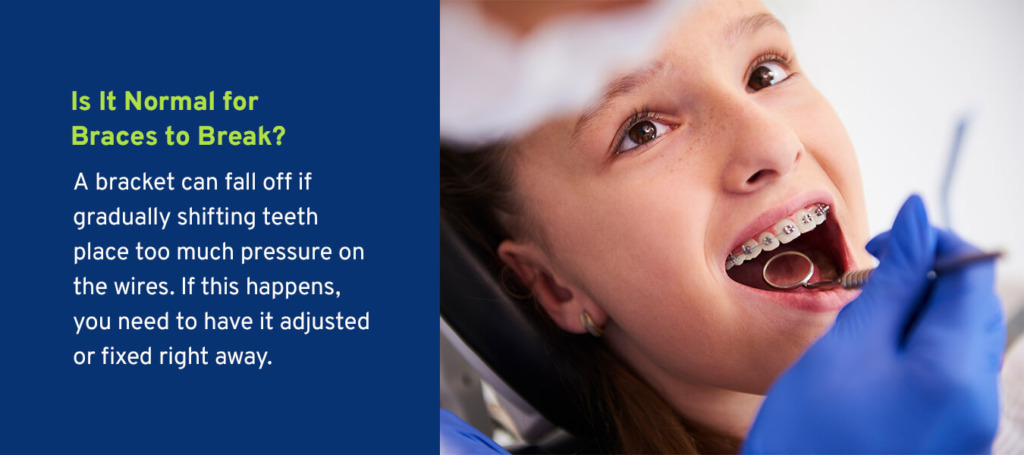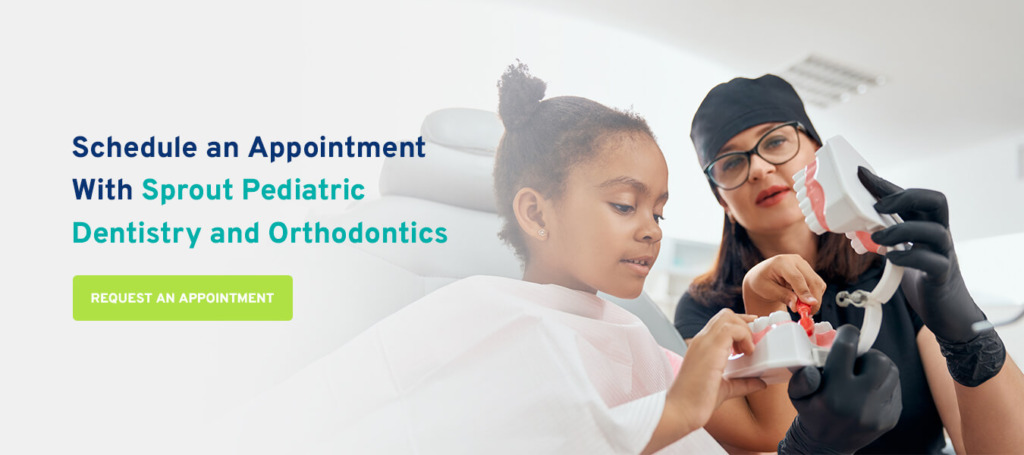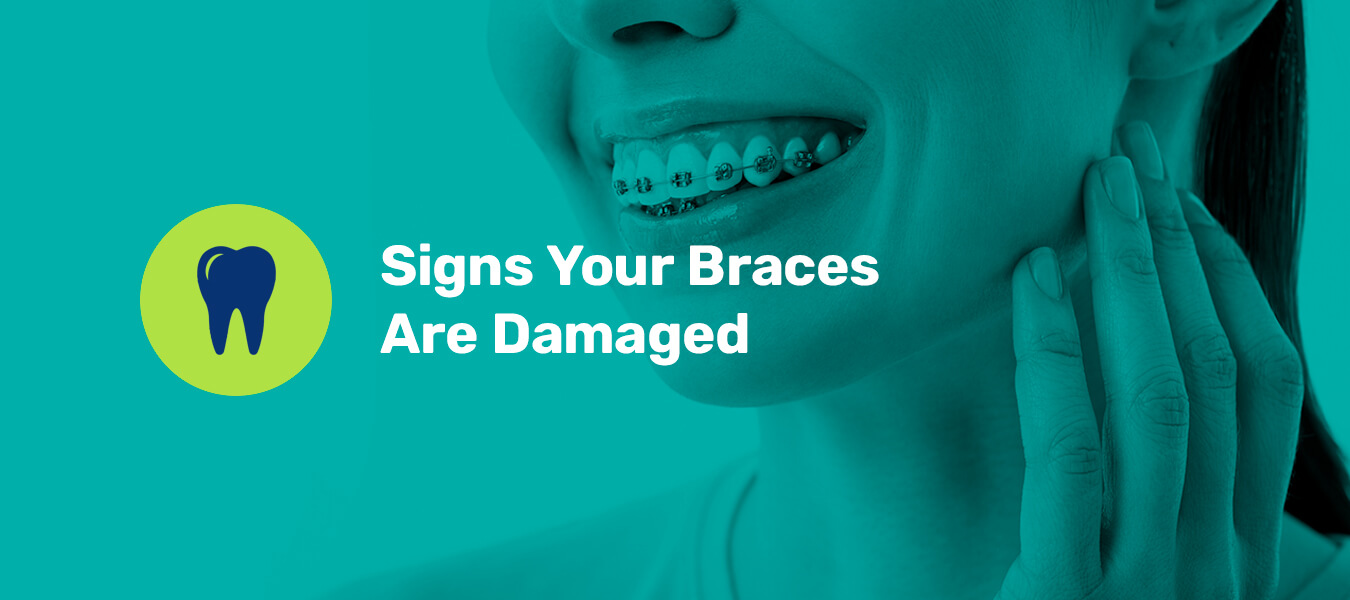If your child has braces, it’s a good idea to know what to do if the brackets break away from the teeth they’re attached to or if your child experiences another problem. Keep reading to learn about common problems with braces.
- Do Your Braces Need Attention?
- Is It Normal for Braces to Break?
- How to Fix Broken Braces
- How to Treat Sores and Cuts in Your Mouth
Do Your Braces Need Attention?
How do you know if your braces wire is broken? The following are potential problems that you should contact your orthodontist about:
- Loose or missing brackets
- Severe discomfort
- Loose bands protruding from molars
- Poking wires
- Stuck food

Is It Normal for Braces to Break?
Children and their parents often wonder what to do if your braces break away from the teeth they’re attached to. Many children and teens with braces have this experience. It can be annoying when it happens, but it is usually an easy fix.
A bracket can fall off of a tooth if gradually shifting teeth place too much pressure on the wires or the bracket itself. If this happens, you need to have it adjusted or fixed in a timely fashion. By allowing your child to continue wearing broken braces for a long time, their teeth will move unpredictably or in the wrong direction.
How to Fix Broken Braces
If your child’s braces break, you should contact their orthodontist for assistance, but in the meantime, here are steps you can take.
- Examine the Damage
- Protect Your Gums From Irritation
- Tuck Your Loose Wire In
- Practice Good Dental Hygiene
- Schedule An Appointment With Your Orthodontist
1. Examine the Damage
Check the braces for any additional damage. If one bracket comes off, you’re more likely to lose another because they’re all connected through the wire.
If you notice a loose bracket that is nearly ready to fall off, see if you can gently wiggle it off and secure it. Avoid using excessive force. Let your dental health professional take care of the problem.
You can have “floating” brackets that pop off your teeth but remain in place on the wire. If a broken bracket bends the wire, it can irritate your teeth and gums.
2. Protect Your Gums from Irritation
If you notice protruding wires that poke into your gums or cheeks, treat the area so you can protect your skin from cuts, swelling and irritation.
The best way to do so is to apply dental wax to the protruding wire. Cutting the wire could injure your mouth or result in you accidentally swallowing a small piece.
3. Tuck Your Loose Wire In
If you have a broken wire sticking up, you can bend it away from your gums using a Q-tip and seal it with orthodontic wax or tape to protect your mouth until you’re ready to see your orthodontist. You might also be able to bend the wire around a bracket to hold it in place. If you don’t have any orthodontic wax, try using chewed sugar-free gum until you can find a replacement.
It might feel uncomfortable or awkward to bite down with a wire tucked in, but this short-term solution is better than allowing the metal wire to poke into the soft parts of your mouth.
4. Practice Good Dental Hygiene
Even if you can’t see your orthodontist immediately, you should continue practicing good hygiene, including brushing and flossing. Make sure your child brushes carefully over any loose parts of the braces. Keeping their mouth clean during this kind of issue will help prevent an infection.
Here are some dental hygiene tips you can follow to keep your mouth clean with loose or broken braces.
- Use an antiseptic rinse: Rinse out your mouth using an antiseptic mouthwash. You can gargle if you feel comfortable, but for young children, it’s best to hold the liquid inside their mouth for 30 seconds to a minute or as long as they feel able.
- Keep brushing and flossing: If you stop brushing because of your discomfort, bacteria will have a chance to grow. Even if a wire breaks, you should keep brushing your teeth, applying gentle pressure if needed.
- Remove food stuck in the braces: Try to pick out any food that gets between your braces and your teeth. If you stop using floss or another method of removing food particles, they will gradually contribute to plaque.
5. Schedule an Appointment With Your Orthodontist
Once you can manage the pain and discomfort, it’s time to schedule an appointment to have the braces reconnected. You will need new brackets to replace the ones that came off, and the orthodontist will have to attach them using the required equipment and tools.
Try to arrange an appointment as soon as reasonably possible. The longer you go with missing or damaged brackets, the longer it will take to align your teeth. When your brackets break, your teeth will gradually begin shifting back into the positions they started in.
How to Treat Sores and Cuts in Your Mouth
If you have sores or cuts in your mouth from damaged braces, contact your dentist or orthodontist and follow these steps.
- Switch to soft foods: If you have a sore inside your mouth, vigorous chewing might irritate it. Start eating soft foods instead. Spicy foods or acidic juices could sting your mouth irritation.
- Suck on ice or a frozen treat: Cooling the inside of your mouth will help keep swelling down.
- Take a pain medicine: Over-the-counter painkillers are usually sufficient for a cut in your mouth.
- Rinse your mouth: Use a saltwater solution to rinse the sore area and help with healing. Rinse after each meal and before going to bed. All you need is a small amount of salt, such as a single teaspoon, in a cup or glass of water.
- Take an antibiotic: A dentist can give you a prescription for an infection, if necessary. Make sure you take your antibiotic as directed, and always finish the full course even if your pain goes away. This is usually a rare occurrence related to orthodontic treatment though.

Schedule an Appointment With Sprout Pediatric Dentistry & Orthodontics
Does your child need braces? At Sprout Pediatric Dentistry & Orthodontics, our team is ready to help. Contact us online to schedule your child’s appointment.

A Portland native, Dr. Paul went to dental school at OHSU and finished his Orthodontic Residency in Philadelphia, PA. Dr. Paul works with children and teenagers at his orthodontic practice.



